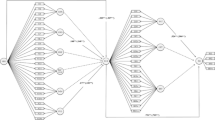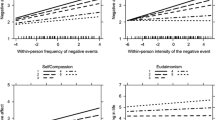Abstract
This paper contains two studies which set out to examine to what extent attributional style (internal, stable, global) and personality traits predicted happiness and psychiatric symptoms in a normal, non-clinical, population of young people in their early twenties. Two hundred and three participants completed five questionnaires: the Attributional Style Questionnaire (ASQ) (version one & version two), Eysenck Personality Questionnaire, Oxford Happiness Inventory, and Langner 22-Item Measure. Sample 1 (n = 120) completed ASQ version one (in both positive and negative situations) and sample 2 (n = 83) completed ASQ version two (in expanded negative situations). Regressional analysis showed that ASQ (in both versions) was the significant predictor of happiness and mental health accounting for 20% to 38% of variances. The ASQ was significantly associated with extraversion and neuroticism. Further, with happiness and mental health as dependent variables and attributional style, personality traits, and demographic variables as independent variables respectively, extraversion and attributional stability (in positive situations) were the significant predictors of happiness accounting for 59% of the total variance whilst neuroticism and psychoticism were the significant predictors of mental health accounting for 53% of the total variance. The results indicated that optimistic attributional style in positive situations was a stronger predictor of self-reported happiness than mental health and pessimistic attributional style in negative situations was a predictor of both happiness and mental health. Extraverts tended to have optimistic explanatory style for positive outcomes whereas neurotics tended to have pessimistic explanatory style for negative outcomes.
Similar content being viewed by others
REFERENCES
Abramson, L.Y., M.E.P. Seligman and J. Teasdale: 1978, 'Learned helplessness in humans: Critique and reformulation', Journal of Abnormal Psychology 87, pp. 49-74.
Alfano, M., T.E. Joiner and M. Perry: 1994, 'Attributional style: A mediator of the shyness-depression relationship?', Journal of Research in Personality 28, pp. 287-300.
Anderson, S.M.: 1991, 'The inevitability of future suffering: The role of depressive certainty in depression', Social Cognition 8, pp. 203-229.
Argyle, M.: 1987, The Psychology of Happiness (Routledge, London).
Argyle,M and L. Lu: 1990, 'The happiness of extraverts', Personality and Individual Differences 11, pp. 1011-1017.
Argyle, M. and M. Martin: 1991, 'The psychological causes of happiness', in F. Strack, M. Argyle and N. Schwarz (eds.), SubjectiveWell-Being: International Series in Experimental Social Psychology (Pergamon Press).
Argyle, M., M. Martin and J. Crossland: 1989, 'Happiness as a function of personality and social encounters', in J. Forgas and J. Innes (eds.) Recent Advances in Social Psychology: An International Perspective (Elseover, North Holland).
Arntz, A., C. Gerlsma and F.A. Albersnagel: 1985, 'Attributional style questioned: Psychometric evaluation of ASQ in Dutch adolescents', Advances in Behaviour Research and Therapy 7, pp. 55-89.
Atlas, G.D., B. Fassett and C. Peterson: 1994, 'Sensitivity to criticism and depressive symptoms', Journal of Social Behaviour and Personality 9, pp. 301-316.
Bradburn, N.M.: 1969, The structure of psychological well-being (Aldine, Chicago).
Bradburn, N.M. and D. Caplovitz: 1965, Reports on Happiness (Aldine, Chicago).
Brebner, J., J. Donaldson, N. Kirby and L. Ward: 1995, 'Relationships between personality and happiness', Personality and Individual Differences 19, pp. 251-258.
Brewin, C.R.: 1985, 'Depression and causal attributions: What is their relation?', Psychological Bulletin 98, pp. 297-309.
Bunce, S. and C. Peterson: 1997, 'Gender differences in personality correlates of explanatory style', Personality and Individual Differences 23, pp. 639-646.
Burns, M.O. and M.E.P. Seligman: 1989, 'Explanatory style across the life span: Evidence for stability over 52 years', Journal of Personality and Social Psychology 56, pp. 471-477.
Corr, P.J. and J.A. Gray: 1996, 'Structure and validity of the attributional style questionnaire: A cross-sample comparison', Journal of Psychology 130, pp. 645-657.
Costa, P. and R. McCrae: 1980, 'Influence of extroversion and neuroticism on subjective well-being: Happy and unhappy people', Journal of Personality and Social Psychology 38, pp. 668-678.
Dykema, J., K. Bergbower and C. Peterson: 1995, 'Pessimistic explanatory style, stress, and illness', Journal of Social and Clinical Psychology 14, pp. 357-371.
Eysenck, H.J. and S.B.G. Eysenck: 1975, Manual of the Eysenck Personality Questionnaire (Hodder and Stoughton, London).
Francis, L., L. Brown, D. Lester and R. Philipchalk: 1998, 'Happiness is stable extraversion', Personality and Individual Differences 24, pp. 167-171.
Furnham, A. and C. Brewin: 1990, 'Personality and happiness', Personality and Individual Differences 11(10), pp. 1093-1096.
Furnham, A. and H. Cheng: 1997, 'Personality and happiness', Psychological Reports 83, pp. 761-762.
Furnham, A. and H. Cheng: 2000, 'Perceived parental behaviour, self-esteem, and happiness', Social Psychiatry and Psychiatric Epidemiology 35, pp. 463-470.
Furnham, A., V. Sadka and C.R. Brewin: 1992, 'The development of an occupational attributional style questionnaire', Journal of Organisational Behaviour 13, pp. 27-39.
Gray, J.A.: 1972, 'The psychophysiological nature of introversion-extroversion: A modification of Eysenck's theory', in V.D. Neblitsyn and J.A. Gray (eds.), Biological Bases of Individual Behaviour (Academic Press, New York).
Headey, B. and A.Wearing: 1991, 'A stock and flow model of subjective well-being', in F. Strack, M. Argyle and N. Schwartz (eds.), SubjectiveWell-Being (Pergamon Press, Oxford).
Johnson, J.G. and S.M. Miller: 1990, 'Attributional, life-event, and affective predictors of onset of depression, anxiety, and negative attributional style', Cognitive Therapy and Research 14, pp. 417-430.
Langner, T.: 1962, 'A twenty-two item screening score of psychiatric symptoms indicating impairment', Journal of Health and Human Behaviour 3, pp. 269-276.
Metalsky, G., L.Y. Abramson, M.E.P. Seligman, A. Semmel and C. Peterson: 1982, 'Attibutional styles and life events in the classroom: Vulnerability and invulnerability to depressive mood reaction', Journal of Personality and Social Psychology 43, pp. 704-748.
Peterson, C. and G. Buchanan: 1995, 'Explanatory style: History and evolution of the field', in G. Buchanan and M. Seligman (eds.), Explanatory Style (LEA, Hillsdale, NJ).
Peterson, C., A. Semmel, C. von Baeyer, L.Y. Abramson, G.L. Metalsky and M.E.P. Seligman: 1982, 'The Attributional Style Questionnaire', Cognitive Therapy and Research 6, pp. 287-300.
Peterson, C. and P.Villanova: 1988, 'An expanded Attributional Style Questionnaire', Journal of Abnormal Psychology 97, pp. 87-89.
Romney, D.M.: 1994, 'Cross-validating a causal model relation attributional style, self-esteem, and depression: An heuristic study', Psychological Reports 74, pp. 203-207.
Sanjuan, P. and A. Palomares: 1998, 'Analysis of attributional style in depressed students', Estudios-de-psicologia 61, pp. 25-33.
Seligman, M.E.P.: 1990, Learned Optimism (Pocket Books, New York).
Seligman, M.E.P., L.Y. Abramson, A. Semmel and C. von Baeyer: 1979, 'Depressive attributional style', Journal of Abnormal Psychology 88, pp. 242-247.
Shader, R., M. Ebert and J. Harmatz: 1971, 'Langner's psychiatric impairment scale: A short screenint device', American Journal of Psychology 128, pp. 596-601.
Xenikou, A., A. Furnham and M. McCarrey: 1997, 'Attributional style and negative events', British Journal of Psychology 88, pp. 53-69.
Author information
Authors and Affiliations
Corresponding author
Rights and permissions
About this article
Cite this article
Cheng, H., Furnham, A. Attributional Style and Personality as Predictors of Happiness and Mental Health. Journal of Happiness Studies 2, 307–327 (2001). https://doi.org/10.1023/A:1011824616061
Issue Date:
DOI: https://doi.org/10.1023/A:1011824616061




